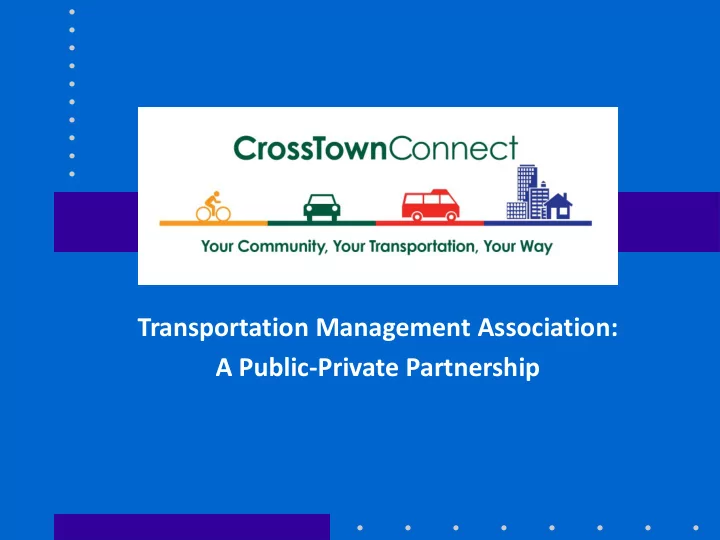

Transportation Management Association: A Public-Private Partnership
The “TMA” Solution Transportation Management Association . . . a partnership between businesses and communities where participants join together to reduce traffic congestion and air pollution and improve transportation options in a defined region.
CrossTown Connect Service Area
What are the problems? Businesses are faced with challenges: Access to the worksite (roadway congestion, pedestrian safety) Recruiting and retention Municipalities seek to resolve broader issues: Dispatch services for community transportation Traffic mitigation Air quality
Establishing CTC • 2009: group of committed local transportation advocates participated in the Massachusetts Institute for Transportation Coordination • 2012: the Governor’s Office funded a collaboration of Acton, Boxborough, Littleton, Maynard, Stow, and Clock Tower Place through the Community Innovation Challenge Grant – Goal: To regionalize transportation services and establish a formal structure for future collaboration – Outside the box approach from day 1 • CrossTown Connect was the result of this collaboration
Central Dispatch Call Center • One of the most unique characteristics of CTC is our Central Dispatch Call Center – Municipal partners opt-in – Program provides a full day of dispatching for community- based services including Council on Aging vans (currently Acton, Boxborough, Littleton, and Maynard) – In addition, the center dispatches/administers other Acton services: The Road Runner for seniors and disabled (LRTA vehicle) The MinuteVan Dial-a-ride for on-demand service to the general public Cross Acton Transportation (CAT) loop shuttle service
Central Dispatch CrossTown Connect Dispatch (w/o Rail Shuttle) 2500 2000 Maynard CoA added May '14 1500 Littleton CoA added March '14 1000 500 0 Jan Feb Mar Apr May Jun Jul Aug Sep Oct Nov Dec Jan Feb Mar Apr 2014 2014 2015
Central Dispatch Call Center • The Center was established to further the goal of regional coordination • By dispatching centrally, data can be gathered on a regional level – Patterns and unmet needs can be better tracked and understood – CTC handles reporting, sends to service provider for submittal as usual • Goal: To further regionalize by sharing all CoA services across current boundaries – This will increase efficiency and decrease redundancies like duplicated trips • Challenge: Member communities straddle two Regional Transit Authorities (RTA’s); LRTA and MART – CTC is currently working with the RTA’s to establish guidelines for sharing that meet the requirements of both
Business Services Enable companies to combine resources to share the costs of transportation programs such as shuttles Example: Red Hat and Juniper Networks have teamed up to share the cost of a shuttle between Alewife and their respective campuses in Westford in the morning and evening TMA staff will administer the contract with shuttle provider Create an effective advocacy group – particularly through groups such as MassCommute (statewide TMA Council)
CrossTown Connect Communities • Participating Communities (FY15 dues): – Acton ($15,000) – Boxborough($5,000) – Littleton ($10,000) – Maynard ($10,000) – Westford ($5,000)
Membership Structure Annual Membership Category Employer Categories Municipality Categories >1,000 Employees $7,500 With Dispatch Services A – 21+ hrs of service 500-999 Employees $5,000 $12,000 B – 10-20 hrs of service 250-499 Employees $2,500 $8,000 C – <10 hrs of service >250 Employees $1,000 $4,000 Developers >200,000 sq ft $5,000 >750 avg. trips/month $3,000 Developers <200,000 sq ft $2,500 500-750 avg. trips/month $2,000 250-499 avg. trips/month $1,000 >300 Housing Units $7,500 <249 avg. trips/month $500 200-299 Housing Units $5,000 100-199 Housing Units $2,500 Total Hours of Service + Avg. Trips <100 Housing Units $1,000 Without Dispatch Services General Membership $5,000 Membership fees for the TMA are tax-deductible as a business expense.
Basic Services Ridematching A database for the purpose of matching employees to carpools and vanpools. By registering, employees expand opportunities to find carpools/vanpools that matches their work schedule and lifestyle. See more matches
Basic Services (cont.) “Emergency Ride Home” Program Ensures commuters who use shared-ride alternatives (carpool, vanpool, transit or “green commute” alternatives) of a ride home in the event of an emergency during work hours. Transports employees in a Using the cab or rental car depending Guaranteed Ride Home Program on the length of the trip 33133 Name: Jane Doe Card No within 30 minutes of If you require a rental vehicle: notification — at no cost 1. Call 1-800-736-8227. Identify yourself as a Guaranteed Ride Home program participant, and state that you need a vehicle. to the employee. 2. Complete the travel voucher you received when you registered and obtain your supervisor’s signature to verify the emergency. 3. Make arrangements to meet the Enterprise representative. 4. Return the car in the morning--replacing the gasoline you used--and you will be driven to work.
Basic Services (cont.) Vanpool Formation Assistance Consists of 9 to 15 people who share the same commute and similar work hours. The group rides together in a commuter van and splits the cost of commuting including the vehicle, insurance, gas, tolls, parking. Employees can use up to $130 per month in tax-free dollars, which also saves employers related payroll costs A review of employer’s workforce origin data can determine if vanpool formation is possible based on the density of employees from a specific region.
Basic Services (cont.) Transportation Fairs Special events designed to generate interest in the TMA’s services. Often held in a cafeteria or building lobby. Frequently, the focus is on getting employees to register for the ridematching database to increase the potential for establishing carpools and vanpools and finding bike buddies. Other topics as applicable, such as shuttle promotion and bike safety
Basic Services (cont.) Promoting Active Commuting Options Events may also be held to promote specific transportation modes such as an annual “Bike to Work” event. The event typically includes a bicyclists’ breakfast, bike tune -ups by a local bicycle shop, T-shirts, prizes, giveaways, and safety clinics. A Healthy Rewards Initiative can be developed to reward commuters for walking and biking by enabling them to earn points based on number of days they walked or biked to work.
Contact Information Scott Zadakis CrossTown Connect 978-929-6457 www.crosstownconnect.org
Recommend
More recommend